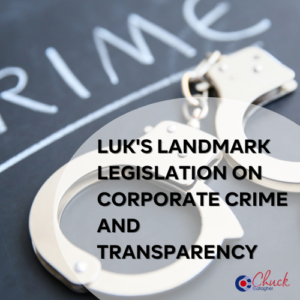 The UK is poised to introduce groundbreaking legislation that promises to redefine the landscape of corporate criminal liability and transparency. The Economic Crime and Corporate Transparency Bill, a pivotal piece of legislation, is set to usher in a new age of accountability for businesses operating within the UK. This bill, which marks a significant shift from traditional legal frameworks, aims to tighten the noose on corporate fraud and enhance transparency in business operations.
The UK is poised to introduce groundbreaking legislation that promises to redefine the landscape of corporate criminal liability and transparency. The Economic Crime and Corporate Transparency Bill, a pivotal piece of legislation, is set to usher in a new age of accountability for businesses operating within the UK. This bill, which marks a significant shift from traditional legal frameworks, aims to tighten the noose on corporate fraud and enhance transparency in business operations.
The bill introduces a novel “failure to prevent” fraud offense akin to the bribery prevention measures of the Bribery Act 2010. This move is a game-changer, as it broadens the scope of corporate responsibility, making it easier to prosecute companies for fraudulent activities conducted by their associates. The implications are far-reaching, especially for large commercial organizations and their subsidiaries, which could now face unlimited fines if associated persons commit fraud that benefits the organization.
Moreover, the bill proposes a significant overhaul of the “identification doctrine” used to establish corporate criminal liability. This reform aims to attribute the actions of senior managers to the company, a departure from the current “directing mind and will test” that limits liability to the actions of a few top executives. This change could potentially increase the accountability of corporations for a range of economic crimes, including theft, fraud, bribery, and tax offenses.
In addition to these criminal liability reforms, the bill also focuses on enhancing corporate transparency. It introduces new identity verification requirements for directors and persons submitting information to Companies House. This measure is designed to make Companies House a more active gatekeeper against economic crime. Companies will now need to ensure that their registered office addresses are appropriate and have full names for all shareholders. The bill also empowers Companies House with more robust investigative and enforcement powers, enabling it to cross-check data and share information with external bodies.
These impending changes underscore the need for companies to reassess their compliance procedures, particularly in relation to fraud risks posed by third parties, including employees. Companies should start preparing ahead of the bill’s enactment to ensure they are in a position to meet the new requirements and avoid potential penalties.
As we stand at the threshold of this new legislative era, it’s clear that the UK is taking bold steps to combat economic crime and promote corporate transparency. This bill reflects the evolving expectations of corporate conduct and sets a precedent for other jurisdictions to follow. For businesses, it’s a call to action to elevate their compliance and transparency standards, aligning them with the new legal landscape.
The Economic Crime and Corporate Transparency Bill represents a significant shift in the UK’s approach to corporate crime and transparency. It’s clear that the era of lax corporate accountability is ending. This is an opportunity for businesses to reassess and strengthen their internal controls and compliance procedures. As we navigate these changes, staying informed and proactive in adapting to this new legal environment is crucial.
For further insights into ethical business practices and navigating the complexities of AI and corporate ethics, feel free to reach out to Chuck Gallagher, business ethics keynote speaker, for speaking engagements or consulting opportunities. Your proactive steps today can shape tomorrow’s more ethical and transparent business world.


